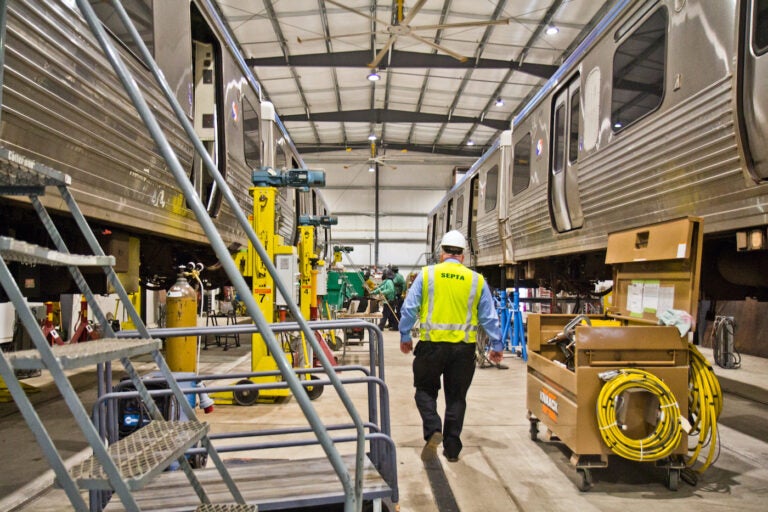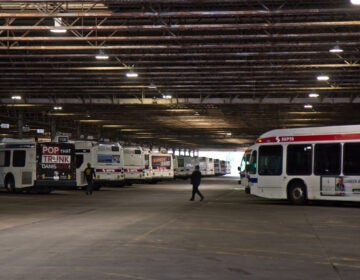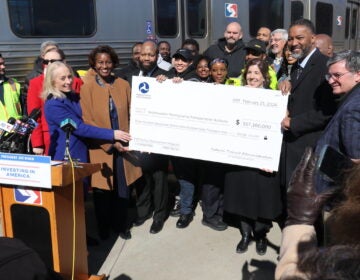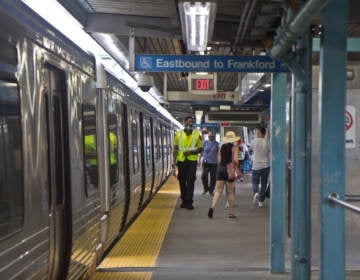Rust, cracked steel and corrosion: SEPTA MFL cars plagued with problems
The 1990s’-era M-4 cars have required a steady stream of repairs at a time when SEPTA faces an unprecedented fiscal challenge.

A 2020 file photo of a SEPTA worker walking through the 69th Street SEPTA repair shop. (Kimberly Paynter/WHYY)
Months after SEPTA revealed that its entire Market-Frankford Line fleet needed repairs for cracking steel, the transit agency acknowledged that it had discovered yet another fault plaguing at least some of its workhorse El cars.
Sources told PlanPhilly in November that a similar problem had been detected on M-4 car chassis over the fall. Last week, Andrew Busch, a SEPTA spokesperson, confirmed that mechanics discovered in September that rust and corrosion had appeared on support beams beneath the entry door sills on an unspecified number of the trains.
“It’s not ideal, but we have to keep evaluating the issue. We wouldn’t call it a defect at this point,” Busch said. “But we also haven’t been able to take apart every car.”
Busch said the issue had thus far been detected on cars that were already in shop to fix the earlier issue with cracking steel using a special welding technique. SEPTA engineers working with engineering consultant LTK were working to check other cars for the issue and come up with yet another fix.
He said no cars have been taken out of service over the new issue — yet.
“It’s pretty early on,” Busch said. “It’s likely that will happen at some point.”
However, the spokesperson did acknowledge that the agency was dropping below the 138 serviceable train cars needed to operate the line at optimal peak hour service.
Out of its 220 90s era M-4 cars, Busch estimated that anywhere from 126 to 138 were operational on any given day. He said the shortage had not resulted in service interruptions because optimal service levels also include a number of spare cars to sub in if a breakdown occurs.
“These cars are about 23 or so years old. Compared to Broad Street Line [subway], they’re in and out of elements more,” Busch said. “Rust on body is not something that’s totally unexpected or rare.”
However, Joe Coccio, secretary-treasurer of the Transport Workers Union Local 234, which represents many blue-collar SEPTA employees, said officials had been aware of systemic metal defects within the fleet since the early 2000s.
“This has been a systematic problem since the cars first rolled into SEPTA’s yards,” said Coccio. “They strengthen and fix one area only for another to start failing.”
He said SEPTA was reaping the fruit of choosing cheaper trains during its decades-old procurement process, and was concerned that it was repeating this process with its current contract for new railcars.
“You get what you pay for. It’s the low-bid process that keeps shooting you in the foot,” Coccio said. “The only thing keeping these cars from killing someone is the round-the-clock maintenance.”
However, the agency disclosed to PlanPhilly in February that it had built a $3.3 million new facility and would spend nearly $20 million in an effort to overhaul the fleet — not only because of systemic cracking but also because the agency wanted to extend the life of the aging M-4 cars, which it lacks the funds to replace.
Busch said last week the agency hoped repairing the new rusting issue could be folded into that process, but that it was still unclear how much that might ultimately cost.
“We can overhaul four cars per month. So we have years to go. We don’t know if this will add time to that timeline,” he said. “But we think we’re still well-positioned to continue with an extended life for the fleet.”
The agency faces a severe fiscal crunch as ridership has plummeted during the pandemic, with officials talking up “doomsday” service reductions in the absence of more federal bailout money — which is currently stalled in congress.
In the meantime, Justin Roczniak, from the Philly Transit Riders Union, praised SEPTA’s efforts to keep the cars in service, but said the agency should be prepared to get creative to prevent service shortages on a “backbone” rail line.
“SEPTA should also provide temporary supplement service such as peak hour express shuttle buses or allow passengers to use their key cards to catch Regional Rail service….so that they can bypass the MFL,” he said.
Busch said the agency also faced other hurdles owing to the human toll the pandemic has taken on the agency — a continuing wave of employees calling out sick shorting available train crews.
“Staffing is a bigger issue,” he said.

Subscribe to PlanPhilly
WHYY is your source for fact-based, in-depth journalism and information. As a nonprofit organization, we rely on financial support from readers like you. Please give today.








